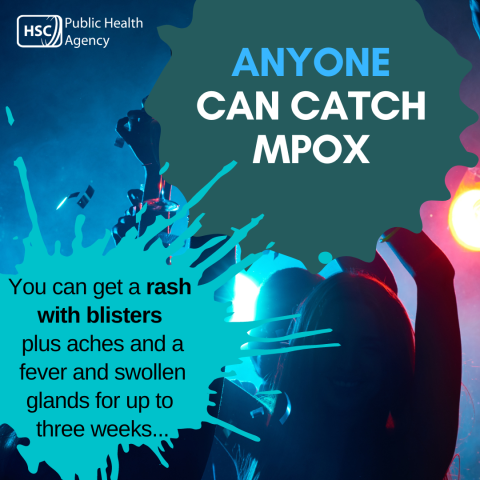Mpox vaccine reminder as cases identified in England

The Public Health Agency (PHA) is continuing to urge people to be vigilant about mpox (formerly known as Monkeypox) and get vaccinated if eligible, following an increase in cases in London over the past four weeks and ahead of summer holidays.
Dr Gillian Armstrong, Consultant in Health Protection at the PHA, said: “Vaccination has played a crucial role in protecting people and reducing case numbers. Those who are eligible but have not yet received both doses of the vaccine are being encouraged to come forward and book their first or second dose as vaccination will continue for those eligible in Northern Ireland.
“Although there have been no new cases detected in Northern Ireland since September 2022, vaccination rates are not particularly high (first dose uptake is 43% and 2nd dose is currently 63%) and therefore we want to remind those at risk that they still need to be vigilant and get vaccinated, particularly as we head into the summer months and many more people will be travelling. We know that out of the latest 10 cases in London, five acquired the infection in the UK and four are thought to have acquired it abroad - half of the individuals diagnosed were unvaccinated and two in people had only received one dose of the vaccine.
“While anyone can catch mpox, the majority of mpox cases in the UK continue to be in gay, bisexual and other men who have sex with men (GBMSM), with the infection being passed on mainly through close contact between people in connected sexual networks. Therefore, those eligible for the vaccine include gay, bisexual or other men who have sex with men who have multiple sexual partners, and those who participate in group sex or attend sex on premises venues. Staff who work in these premises are also eligible.
“Anyone who thinks they may be eligible and has not yet received their first dose or completed their vaccinations should contact their local GUM clinic and enquire about getting the vaccine.”
What is mpox?
- It is caused by the monkeypox virus, a member of the same family of viruses as smallpox, although it is much less severe.
- Initial symptoms include fever, headaches, swellings, back pain, aching muscles.
- Once the fever breaks a blistering rash can develop, often beginning on the face or genitals and then spreading to other parts of the body. The rash goes through several stages which include flat spots, raised spots, blisters and then scabbing.
- Anyone with the virus should abstain from sex while they have symptoms, to help prevent passing it on to others.
- Vaccination protects against mpox.
For further information on mpox and what to do if you think you may have contracted mpox see www.gov.uk/guidance/monkeypox
Vaccination programme leaflets can be found here www.pha.site/mpox
